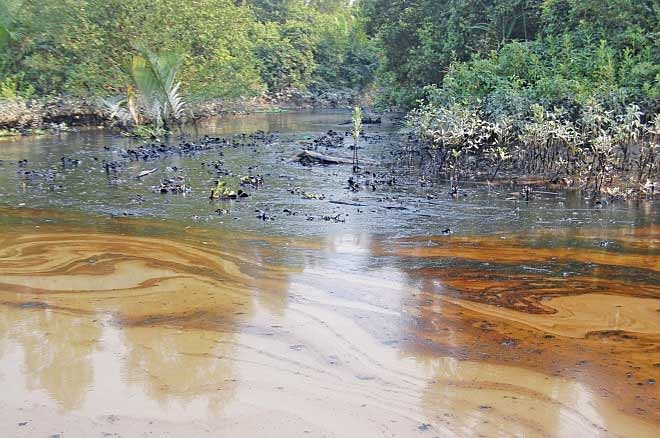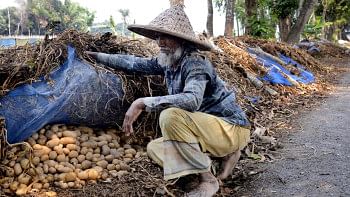SILENT CRY OF THE SUNDARBANS

Bangladesh's last environmental sanctuary, the largest contiguous mangrove forest on earth, Sundarbans is dying. Its death sentence has been confirmed by the industrialisation of the adjacent area especially after the beginning of the construction of Rampal Power Plant; a massive coal fired power plant only 14 km away from the forest. As a result, wild rivers and creeks of the once impenetrable Sundarbans have turned into a popular route for cargo vessels and oil tankers. The rumbling noise of the diesel engines and higher powered search lights of these vessels have also been driving wild animals away from their last remaining sanctuary in the country.
A disaster was inevitable. And that disaster took place on December 9, 2014. Collision between a cargo vessel and the oil tanker Southern Star VII resulted in a massive oil spill. 350,000 litres of furnace oil spread over 10,000 square kilometres of this mangrove forest creating a black coat of oil over the rivers, shores and the forest floor. Amir Hussain, chief forest official of the Sundarbans in Bangladesh, informed reporters, “This catastrophe is unprecedented in the Sundarbans and we don't know how to tackle it.”

We have been observing practical examples of Hussain's frank apology for 11 days. While hundreds of animals, including rare species like the Irrawaddi dolphins, are dying due to the oil spill, the only noticeable measure taken by the government to recover from this disaster is a manual clean-up of the spilled oil. Government's buy-back plan to purchase the leaked oil at Tk 30 per litre has pushed thousands of local villagers to collect it from the rivers and the forest. These villagers, including children, are collecting the oil without any protective clothing, using kitchen utensils, shovels and sponges. Research shows that long term exposure to benzene, the most common and toxic ingredient of furnace oil, can cause leukaemia. Dr. Badrul Imam, Professor of Geology Department, University of Dhaka commented that toxic chemicals of furnace oil can also cause skin cancer, and lung, kidney and liver damages depending on whether the chemicals are touched, inhaled or eaten. People are also cutting down trees indiscriminately to collect the oil accumulated on the roots and barks of the trees.
Nowadays, the occurrence of oil spills and its effective management is not too uncommon or difficult. The Bangladesh government did not use chemical dispersants to avoid further contamination but there are other more feasible ways that can be considered. Dr Imam commented, “There are available modern technologies like booms, skimmers, sorbents which can be obtained from many countries to tackle this disaster. Using manual labour to remove oil is outdated and ineffective.” But the question is how can we save the Sundarbans when the government is not recognising this disaster at all?

Ten days after the disaster, environment minister Anwar Hossain Manju paid a half an hour visit to the spot, saying, “The extent of damage is not as much as we had anticipated. Some oil coated trees and herbs of the river banks will die but they will grow again next year, as our Chief Conservator of Forests said.” (December 19, 2014 The Daily Prothom Alo) Similar comments were made by the Shipping Minister Shahjahan Khan who denied the fact of fatal consequences. In fact reports say that the cargo vessels and oil tankers are still using the Shela River, the spot of the accident, and other channels inside the forest at night ignoring the government's order not to use them. On top of that, the government is going to establish another 150 MW furnace oil fired power plant in Mongla, which is within striking distance from Sundarbans. (December 21, The Daily Kaler Kontho)
Whether our government admits it or not, the fact is that the Sundarbans is getting destroyed. Plants and animals are dying, breeding has stopped and many animals are leaving the Bangladeshi parts of the Sundarbans.
Scavengers like vultures and kites are seen flying over the forest constantly indicating that animals are dying deep inside the forest. Junaid K Choudhury, who has been researching on mangrove forests and the Sundarbans for 25 years, told the Prothom Alo, “Among all kinds of forests, mangrove is the most susceptible one. This oil spill can cause damage that we will not be able to identify in two to three months even in two to three years. Perhaps after 10 years we will discover that a particular species was lost from this forest forever thanks to the oil spill.”
The Sundarbans not only shelters some of the rarest species of animals in the world but also saves us from coastal super cyclones like Sidr. Bangladesh's survival depends on the survival of the Sundarbans. The damage has already been done. But to prevent further occurrences we must come forward to prevent tne destruction of this life bowl. Not only the Shella river, but all the waterways inside the forest have to be protected from commercial navigation. Power plants and industries have to be relocated to safer distances from the forest. Otherwise, there will be no Sundarbans in the near future and the consequences of that will be dire.
The writer can be contacted at [email protected]

 For all latest news, follow The Daily Star's Google News channel.
For all latest news, follow The Daily Star's Google News channel. 



Comments